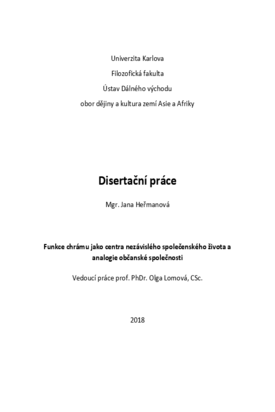Funkce chrámu jako centra nezávislého společenského života a analogie občanské společnosti
A Temple and its Functions as an Independent Social Life Centre and an Analogy to Civil Society
dizertační práce (OBHÁJENO)

Zobrazit/
Trvalý odkaz
http://hdl.handle.net/20.500.11956/104597Identifikátory
SIS: 104864
Kolekce
- Kvalifikační práce [25012]
Autor
Vedoucí práce
Oponent práce
Zemánek, Marek
Dluhošová, Táňa
Fakulta / součást
Filozofická fakulta
Obor
Dějiny a kultury zemí Asie a Afriky
Katedra / ústav / klinika
Ústav Dálného východu
Datum obhajoby
28. 6. 2018
Nakladatel
Univerzita Karlova, Filozofická fakultaJazyk
Čeština
Známka
Prospěl/a
Klíčová slova (česky)
lidové náboženství|bohyně Mazu|občanská společnost|tradice|TaiwanKlíčová slova (anglicky)
popular religion|goddess Mazu|civil society|tradition|TaiwanPráce se zabývá chrámovými kulty na Taiwanu, tyto chrámy jsou jevem, který nemůže žádný návštěvník ostrova přehlédnout, ať už ve městech nebo na venkově, neboť se jedná o živá místa neustále plná lidí. Centrem chrámového kultu je obvykle jedno hlavní božstvo, ale v chrámu je uctíváno i mnoho dalších božstev. Chrám pak bývá zvláště na venkově centrem celé obce. Četné aktivity obce (nejen náboženské, ale i sportovní a vzdělávací atd.) bývají organizovány nebo alespoň podporovány chrámem. Práce čtenáře seznámení s podobou chrámu a jeho fungováním v oblasti víry, současně sleduje, jak se chrám podílí na stmelování místního společenství a jaký je vztah chrámových kultů ke státu - s možností posoudit potenciál tradičních chrámových náboženství k plnění funkce analogické k funkcím moderní občanské společnosti. Současně je v práci nastíněn vývoj postavení chrámových kultů na Taiwanu v průběhu dvacátého a na počátku jednadvacátého století na pozadí politických a společenských změn na Taiwanu, kdy se lidové náboženství v očích vládnoucích vrstev státu postupně proměňuje z pověry, kterou je třeba vyhubit, v důležitou součást kultury a identity Taiwanu. Nedílnou součástí práce je i stručné zamyšlení nad obnovováním náboženských tradic, ke kterému dochází v době velkého rozkvětu lidového náboženství od...
Religious life in Taiwan has experienced a great revival since the political relaxation in 1980's; especially the popular religion and new religious movements have been blooming. Temple festivals are growing again; restored or newly established events organized by temples emerge. There is usually one main deity in the centre of the temple cult, but there are many other deities worshipped in a particular temple as well. The temple is often a centre of a town or a village, especially in the countryside. Temples organize or at least support many activities (not only religious ones, but also sport and educational activities etc.) in villages and towns. The thesis introduces temples and their work in the field of belief. At the same time it looks at the ways a temple help people to create a local community, and what is the relationship between the state and temple cults. There is an attempt to see the potential of traditional temple religions to fulfil function similar to function of modern civil society. The thesis also introduces the development of the status of temple cults in Taiwan on the background of political and social changes during the 20th and at the beginning of the 21st century. During this period, the popular religion gradually transforms from a superstition that should be annihilated...
